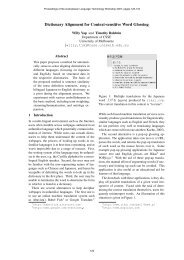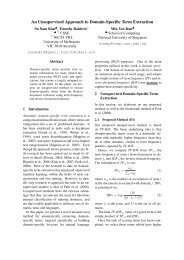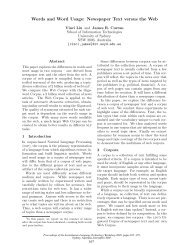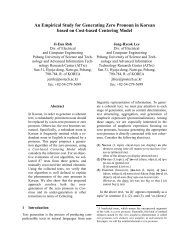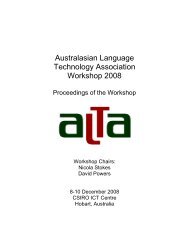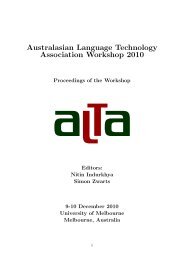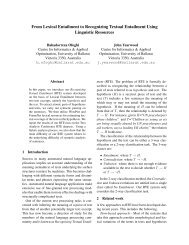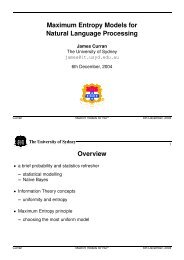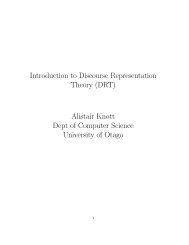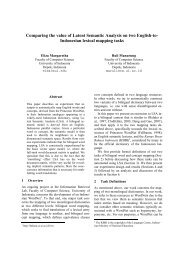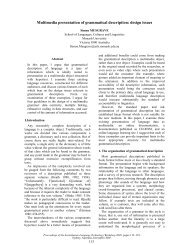Full proceedings volume - Australasian Language Technology ...
Full proceedings volume - Australasian Language Technology ...
Full proceedings volume - Australasian Language Technology ...
Create successful ePaper yourself
Turn your PDF publications into a flip-book with our unique Google optimized e-Paper software.
Free-text input vs menu selection: exploring the difference with a<br />
tutorial dialogue system.<br />
Jenny McDonald 1 , Alistair Knott 2 and Richard Zeng 1<br />
1 Higher Education Development Centre, University of Otago<br />
2 Department of Computer Science, University of Otago<br />
jenny.mcdonald@otago.ac.nz<br />
Abstract<br />
We describe the in-class evaluation of<br />
two versions of a tutorial dialogue system<br />
with 338 volunteers from a first-year<br />
undergraduate health-sciences class. One<br />
version uses supervised machine-learning<br />
techniques to classify student free-text responses;<br />
the other requires students to select<br />
their preferred response from a series<br />
of options (menu-based). Our results indicate<br />
that both the free-text and menu-based<br />
tutors produced significant gains on immediate<br />
post-test scores compared to a control<br />
group. In addition, there was no significant<br />
difference in performance between students<br />
in the free-text and menu-based conditions.<br />
We note specific analysis work still to do as<br />
part of this research and speculate briefly<br />
on the potential for using tutorial dialogue<br />
systems in real class settings.<br />
1 Introduction<br />
In large undergraduate classes (1500-1800 students),<br />
it is time-consuming, costly and seldom<br />
practical to provide students with feedback on<br />
their conceptions other than by computer-based<br />
marking of formative assessments. Typical examples<br />
of this include Learning Management System<br />
(LMS) based multiple-choice quizzes or similar.<br />
Most computer-assisted assessment involves students<br />
being able to recognise a correct response<br />
rather than recall and independently generate an<br />
answer. In the context of the first-year undergraduate<br />
health sciences course that we studied, currently<br />
all computer-assisted assessment takes this<br />
form. In 2008, the coordinator of a first year undergraduate<br />
health sciences class asked us about<br />
ways in which technologies might assist students<br />
to practice writing short-answer questions. As a<br />
result of this request, we wanted to investigate<br />
whether students answering questions with freetext<br />
or multiple-choice(menu-based) selections in<br />
a tutorial dialogue setting would result in performance<br />
gains on student test scores and whether<br />
there would be any difference in performance between<br />
students who generated free-text answers<br />
and those who selected their preferred answer<br />
from a number of options. In the next section<br />
we begin with a brief literature review from the<br />
fields of both Education and Cognitive Science.<br />
Next, we briefly describe the design and features<br />
of our tutorial dialogue system. The experimental<br />
design, and results are described in subsequent<br />
sections and we conclude with a discussion of our<br />
key findings.<br />
2 Background<br />
This study is situated at the boundaries between<br />
at least three established fields of inquiry: educational<br />
assessment research; psychological research,<br />
in particular the study of memory, recognition<br />
and recall; and finally intelligent tutoring<br />
systems (ITS) and natural language processing<br />
(NLP) research.<br />
Since the 1920s the positive benefits on student<br />
performance of answering practice, or formative<br />
assessment, questions have been demonstrated<br />
in classroom studies (Frederiksen, 1984).<br />
Similar positive effects have been demonstrated<br />
in psychology laboratory studies since the 1970s.<br />
(McDaniel et al., 2007) Large meta-analytic educational<br />
studies looking at the impact of practice<br />
tests on student outcomes indicate that on average,<br />
the provision of practice assessments during<br />
a course of study does confer a clear advan-<br />
Jenny Mcdonald, Alistair Knott and Richard Zeng. 2012. Free-text input vs menu selection: exploring the<br />
difference with a tutorial dialogue system. In Proceedings of <strong>Australasian</strong> <strong>Language</strong> <strong>Technology</strong> Association<br />
Workshop, pages 97−105.



